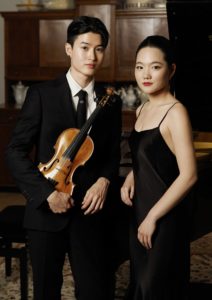
Program :
| Engen Ysaÿe (1858 – 1931) | Violin Sonata No. 2 |
| Ludwig van Beethoven (1770-1827) | Violin piano Sonata No. 5 in F major, Op. 24 |
| Intermission | |
| Frédéric François Chopin (1810-1849) | Fantaisie-Impromptu in C♯ minor, Op. posth. 66 Nocturne in D-flat Major, Op. 27 No. 2
Waltz in A-flat Major, Op. 42 |
| Fritz Kreisler (1875-1962) | 3 Old Viennese Dances Liebesleid
Schön Rosmarin Liebesfreud |
| Pablo de Sarasate (1844-1908) | Zigeunerweisen, Op. 20 |
Yesse KIM
Since its solo beginnings at the age of nine at the Kumho Arts Hall in Seoul, the Korean-American pianist Yesse Kim has occurred many times in the United States, Asia and Europe.
Prestigious series of concerts such as the Korea-China Exchange Concert of Piano, the Yamaha Young Performing Artists and the Kumho Young Artist included it in their programming.
As a soloist, she played with orchestras such as the Seoul Philharmonic Orchestra, Daejeon Sangrok, Birmingham-Bloomfield, Ann Arbor, Dearborn and Kankakee Valley Symphony. She was a winner of the Asia Chopin Piano Competition, of the Kingsville International Piano Competition, of the Lennox Young Artist International Competition and the Ischia International Piano Competition.
Yesse Kim obtained his license and master’s degree from Yong Hi Moon at the Peabody Institute of Johns Hopkins University in America, thanks to a full Ruth J. Brouse Bauer scholarship. With the support of a DAAD scholarship, she began her concert diploma with Professor Arnulf von Arnim at Musikhochschule Münster in 2018.
Since her arrival in Europe, she has become a sought after pianist. His concerts led him through France, Italy, Spain, Austria and Germany. In addition, she maintains a dynamic concert activity in her country of origin, South Korea, where she returns regularly for concerts.
Daehyeon KANG
Daehyeon Kang, born in South Korea in 1999, is a very accomplished violinist. He trained at the Gyeongbuk Arts High School and the Institut des Arts de Daegu for gifted students, before settling in Germany in 2019. He obtained his baccalaureate with the highest distinctions
At Musikhochschule Münster under the direction of Professor Koh Gabriel Kameda and immediately started his master’s studies. Kang’s talent has been recognized by numerous prizes, including first prizes in major Korean competitions and Austrians, as well as the prestigious DAAD Prize in 2023.
Kang occurred abundantly as a soloist, chambrist and orchestra musician through Europe and Asia. He played with orchestras such as the Radio Symphony Orchestra MBC and Kammerensemble Münster, interpreting renowned concertos. His performances led him to various cities in Germany, Spain and Portugal. He participated in the “Sound of Change” project, performing at the Ljubljana festival, and was presented at the Lindlar piano festival.
Since 2022, Kang has run the « Echo Ensemble », which has occurred in prestigious festivals such as the Coblence International Music Festival and the Münsterland Festival, demonstrating its leadership and musical vision. He is a scholarship holder of the « Live Music Now Foundation » and plays on a violin of the Klotz family of the 18th century.
